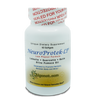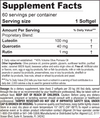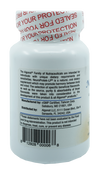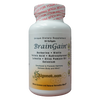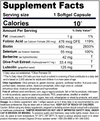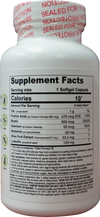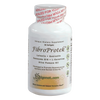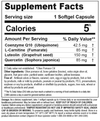NeuroProtek® is a unique all natural oral dietary supplement in a soft gel capsule, which may reduce symptoms of gut and brain inflammation and nerve damage. NeuroProtek® uses an exclusive combination of flavonoids, based on the scientific research of Dr. Theoharides M.D., PhD, which have shown to reduce oxidative stress and inflammation both in the gut and the brain. NeuroProtek® is formulated to maximize the anti-inflammatory affects of flavonoids while also overcoming any absorption obstacles. NeuroProtek® contains the flavonoids: Luteolin, Quercetin, and Rutin. Unique to Algonots formulations is olive kernel oil, a powerful anti-oxidant that is instrumental in helping the body absorb and delivery the dry flavonoids found in each soft gel capsule. NeuroProtek® is free of the following allergens: artificial colors or dyes, flavors or sweeteners, corn, eggs, fish, heavy metals, milk/casein, peanuts, preservatives, salt, shellfish, starch, sugar, tree nuts, wheat/gluten and yeast. Our ingredients are not obtained from beef or beef by-products.
Flavonoids are natural molecules found mostly in green plants and seeds. Unfortunately, our modern life diet contains progressively fewer flavonoids and those that are consumed are difficult to absorb because they do not dissolve in water. Under these conditions, the average person cannot consume enough to make a positive health difference. There are approximately 3,000 flavonoids. Of those, NeuroProtek® contains three:
Luteolin (Chamomile > 95% Pure) is one of the three flavonoids found in NeuroProtek® . Luteolin was incorporated in this formula after published papers showed it is important in the body: as a free radical scavenger, an agent in the prevention of inflammation, an immune system modulator and it mimics a normal compound that protects nerve damage.
Quercetin (Saphora Plant > 95% Pure) is a natural non-acidic (flavanoid) with potent anti-inflammatory capabilities. Quercetin is added to NeuroProtek® to help relieve the swelling associated from inflammatory disease and protect from further damage associated with mast cell activation. The Quercetin used in NeuroProtek® is obtained from the saphora plant. Algonot decisively choose not to use the more common and less expensive source of fava beans, which could cause hemolytic anemia, particularly in people of Mediterranean origin.
Rutin (Saphora Plant > 95% Pure) is a glycoside of the flavonoid Quercetin. Like quercetin, rutin is extracted from the saphora plant and is a non-acidic natural flavonoid that adds additional anti-inflammatory qualities. Rutin helps liberate quercetin in the intestine, making absorption easier. Rutin has been shown to be the strongest antioxidant in studies.
Olive Kernel Oil (Unprocessed, MicroFiltered) Olive kernel oil is a potent low-acidic anti-oxidant that can help repair damaged tissues. This unique oil (a lipid) plays an important role in NeuroProtek® as it is used to increase the absorbability of these flavonoids. We use only virgin olive seed oil from the island of Crete.
While some benefit may be noticed shortly after starting NeuroProtek, it may take 6-12 months before measurable benefits are observed . NeuroProtek® does not require a prescription. NeuroProtek is not a cure. NeuroProtek is not an analgesic.
People considering using NeuroProtek should consult their doctor. Please print this information or request a packet of information to be sent to your doctor.
Trademarks and Patents Dr. Theoharides developed NeuroProtek® and is the recipient of US patents No. 6,624,148; 6,689,748; 6,984,667; 7,115,278 and EPO 1365777, which cover methods and compositions of mast cell blockers in neuroinflammatory conditions. All patents have been assigned to Theta Biomedical Consulting and Development Co., Inc. (Brookline, MA, USA) The name NeuroProtek® has been trademarked in the USA with US registration No. 3225924 and has also been assigned to Theta Biomedical Consulting and Development Co., Inc. (Brookline, MA, USA) Potential Conflict Dr. Theoharides is the Scientific Director of Algonot, LLC but receives no compensation. All clinical trials with this product are being conducted or will be conducted under the supervision of other clinicians at sites other that the Academic Medical Center where Dr. Theoharides works.
Why the chosen flavonoids?
Flavonoids are naturally occurring compounds frequently found in green plants and seeds. In powder form, whether taken as pills, tablets or hard capsules, all flavonoids are difficult to absorb and are extensively metabolized to inactive ingredients in the liver. In fact, less than 10% of orally ingested flavonoids are absorbed.
In addition, very few flavonoids are beneficial; instead, many others such as morin have no anti- inflammatory activity, while pycnogenol is weakly active (as compared to luteolin or quercetin) but could cause liver toxicity.
As an additional consideration, the most common commercial source of the flavonoid quercetin is fava beans, which can induce hemolytic anemia (destruction of all the blood cells) in those of Mediterranean origin (15%), who lack the enzyme glucose-phosphate dehydrogenase (G6PD). Quercetin and its closely, structurally related flavonoids rutin and luteolin, have potent anti-oxidant and anti- inflammatory actions. Quercetin and luteolin can also inhibit the release of histamine and prostaglandin D2 (PGD2), as well as the pro-inflammatory molecules IL-6, IL-8, and TNF from human cultured mast cells. Moreover, quercetin inhibits mast cell activation stimulated by IL-1, and mast cell-dependent stimulation of activated T cells involved in auto- immune diseases. Luteolin also inhibits IL-6 release from microglia cells, as well as IL-1- mediated release of IL-6 and IL-8 from astrocytes. Quercetin also inhibited and reversed acute stress-induced autistic-like behavior and the associated reduced brain glutathione levels in mice. Can other preparations of the elect flavonoids be used?
There are about 3,000 flavonoids in nature and many impure flavonoids are sold under such names as
bioflavonoids, citrus flavonoids, soy flavonoids, or pycnogenol. Even those preparations claiming to
have only the select flavonoids, DO NOT specify either the source or the purity of the flavonoids. This problem is even worse given that many autistic patients could have reactions to the impurities, fillers or dyes.
The selection of specific beneficial flavonoids, as well as the source, purity and absorbability of those
flavonoids were taken into consideration in order to develop the most beneficial product with the least amount
of associated risk, NeuroProtek®.
References
Middleton E Jr, Kandaswami C, Theoharides TC. The effects of plant flavonoids on mammalian cells: implications for inflammation, heart disease, and cancer. Pharmacol Rev. 2000 Dec;52(4):673-751.
Kempuraj D, Madhappan B, Christodoulou S, Boucher W, Cao J, Papadopoulou N, Cetrulo CL, Theoharides TC. Flavonols inhibit proinflammatory mediator release, intracellular calcium ion levels and protein kinase C theta phosphorylation in human mast cells. Br J Pharmacol. 2005 Aug;145(7):934-44.
Kandere-Grzybowska K, Kempuraj D, Cao J, Cetrulo CL, Theoharides TC. Regulation of IL-1-induced selective IL-6 release from human mast cells and inhibition by quercetin. Br J Pharmacol. 2006
May;148(2):208-15.
Kempuraj D, Tagen M, Iliopoulou BP, Clemons A, Vasiadi M, Boucher W, House M, Wolfberg A, Theoharides TC. Luteolin inhibits myelin basic protein-induced human mast cell activation and mast cell- dependent stimulation of Jurkat T cells. Br J Pharmacol. 2008 Dec;155(7):1076-84.
Success Rate
Though to date the trials of NeuroProtek® are limited, the results are very promising. In the initial trial ten children (ages 3-8) diagnosed with autism were orally administered a total of four NeuroProtek® capsules per day for a period of 4 6 months. At the end of the trial period, the parents of the patients observed a significant improvement of core autism symptoms, such as poor communication skills and social interactions. In the best case outcome, two children (one boy and one girl, ages 4 and six years old, respectively), who prior to treatment were unable to speak, could not identify words, would get upset when asked to repeat a task, and would break into wing flapping movements, after treatment were able to answer simple questions, could make words with block letters, and would allow the researcher to hold them. Given the encouraging outcome of trials to date, applications for randomized, double-blind, placebo-controlled clinical trials have been submitted by Dr. Theoharides to the National Institute of Health, and the Department of Defense. Luteolin and Quercetin, and its related flavonoid rutin are safe because they are purified from chamomile. .
Riks/Side Effects
The NeuroProtek® formulation will be covered by a Certificate of Free Sale from the Food and Drug Administration (FDA). This certification ensures the amount, purity, source and manufacturing of the ingredients are in a facility inspected by the FDA and fulfilling Good Manufacturing Practices (GMP). There are no side effects known; however, this formulation (as well as any flavonoids) must be used with
caution with drugs that are heavily metabolized by the liver as it may affect the resulting blood levels of such compounds. References
Harwood M, Danielewska-Nikiel B, Borzelleca JF, Flamm GW, Williams GM, Lines TC. A critical review of the data related to the safety of quercetin and lack of evidence of in vivo toxicity, including lack of genotoxic/carcinogenic properties. Food Chem Toxicol. 2007 Nov;45(11):2179-205.
THESE STATEMENTS HAVE NOT BEEN EVALUATED BY THE FDA. THIS PRODUCT IS NOT INTENDED TO DIAGNOSE, TREAT, CURE, OR PREVENT ANY DISEASE.














